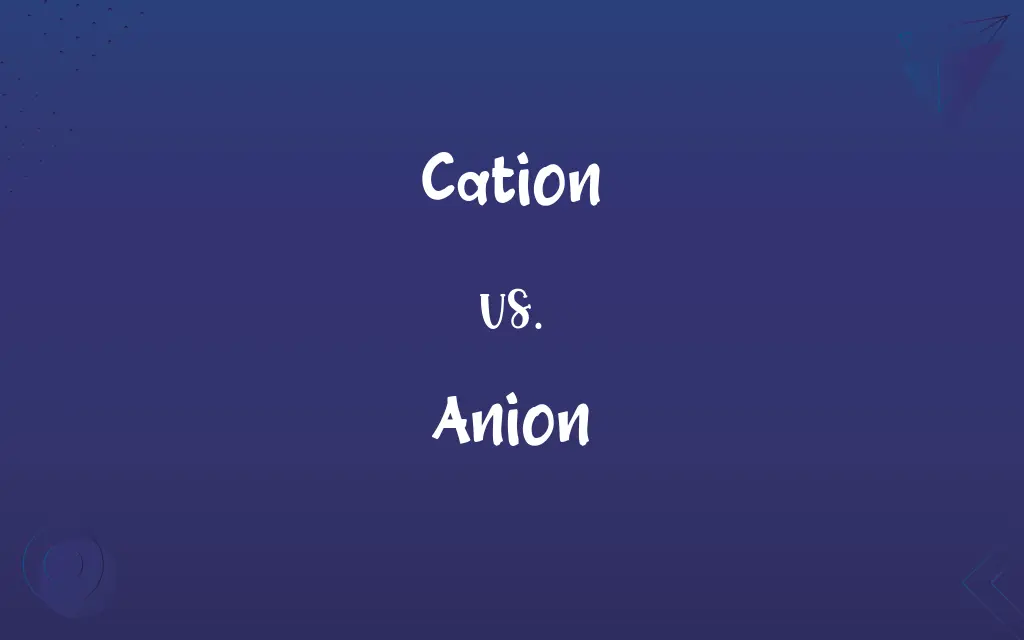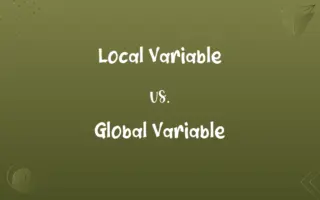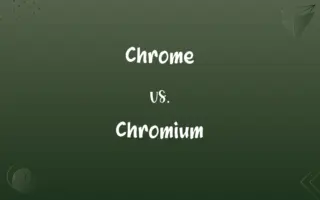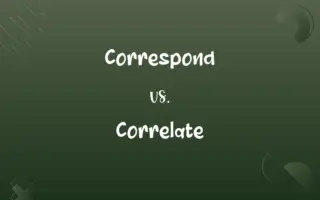Cation vs. Anion: Know the Difference

By Shumaila Saeed || Updated on December 25, 2023
Cations are positively charged ions, while anions are negatively charged ions.

Key Differences
Cations are ions with a positive charge, formed when atoms lose electrons. Anions, on the other hand, are ions with a negative charge, created when atoms gain electrons. This fundamental difference in charge results from the loss or gain of valence electrons, altering the balance between protons and electrons in an atom.
Shumaila Saeed
Nov 22, 2023
Cations are typically metals, which tend to lose electrons due to their electronic structure. Anions are usually nonmetals, which gain electrons to achieve a full outer electron shell. The nature of the originating atom determines whether an ion will be a cation or anion.
Shumaila Saeed
Nov 22, 2023
In chemical reactions, cations and anions come together to form ionic compounds. The positive charge of cations and the negative charge of anions attract each other, leading to the formation of stable ionic bonds, a cornerstone of many compounds.
Shumaila Saeed
Nov 22, 2023
Cations and anions play vital roles in the conductivity of solutions. When dissolved in water, cations and anions separate and move freely, allowing the solution to conduct electricity. This process is fundamental in electrochemistry and various applications like batteries.
Shumaila Saeed
Nov 22, 2023
In biological systems, cations and anions are crucial for functions like nerve impulse transmission and muscle contraction. Sodium (Na+), a cation, and chloride (Cl-), an anion, are key electrolytes in bodily fluids, maintaining vital physiological balances.
Shumaila Saeed
Nov 22, 2023
ADVERTISEMENT
Comparison Chart
Biological Importance
Involved in nerve transmission
Essential for cell functions
Shumaila Saeed
Nov 22, 2023
ADVERTISEMENT
Cation and Anion Definitions
Cation
Cations are essential in biological systems.
Potassium cations are crucial for heart function.
Shumaila Saeed
Nov 17, 2023
Anion
Anions are typically nonmetal atoms in ionic compounds.
In sodium chloride, chloride is the anion.
Shumaila Saeed
Nov 17, 2023
Cation
Cations are usually metal atoms in ionic compounds.
In copper sulfate, Cu2+ acts as the cation.
Shumaila Saeed
Nov 17, 2023
Anion
An anion is a negatively charged ion.
Chloride (Cl-) is an anion in table salt.
Shumaila Saeed
Nov 17, 2023
Cation
Cations play a key role in electrical conductivity.
In a battery, lithium cations move to create current.
Shumaila Saeed
Nov 17, 2023
ADVERTISEMENT
Anion
Anions form by gaining one or more electrons.
Oxygen becomes an O2- anion by gaining electrons.
Shumaila Saeed
Nov 17, 2023
Cation
A cation is a positively charged ion.
Sodium (Na+) is a common cation in salt.
Shumaila Saeed
Nov 17, 2023
Anion
Anions are important in various chemical reactions.
Nitrate anions are key in plant nutrition.
Shumaila Saeed
Nov 17, 2023
Cation
Cations form by losing one or more electrons.
When magnesium loses two electrons, it becomes a Mg2+ cation.
Shumaila Saeed
Nov 17, 2023
Anion
Anions help maintain physiological functions.
Bicarbonate anions regulate blood pH.
Shumaila Saeed
Nov 17, 2023
Cation
An ion or group of ions having a positive charge and characteristically moving toward the negative electrode in electrolysis.
Shumaila Saeed
Oct 19, 2023
Anion
A negatively charged ion, especially the ion that migrates to an anode in electrolysis.
Shumaila Saeed
Oct 19, 2023
Cation
(physical chemistry) a positively charged ion, i.e. one that would be attracted to the cathode in electrolysis
Shumaila Saeed
Oct 19, 2023
Cation
A positively charged atom, radical, or molecule, which in electrolysis migrates to the cathode; a positive ion; - opposed to anion.
Shumaila Saeed
Oct 19, 2023
Anion
An electro-negative atom or group of atoms, or the element which, in electro-chemical decompositions, is evolved at the anode; - opposed to cation.
Shumaila Saeed
Oct 19, 2023
Repeatedly Asked Queries
What role do cations play in ionic bonds?
They attract anions to form stable compounds.
Shumaila Saeed
Nov 22, 2023
How do cations differ from anions in charge?
Cations are positive, while anions are negative.
Shumaila Saeed
Nov 22, 2023
Can an element form both cations and anions?
Typically, metals form cations and nonmetals form anions.
Shumaila Saeed
Nov 22, 2023
What role do anions play in ionic bonds?
They attract cations to form stable compounds.
Shumaila Saeed
Nov 22, 2023
Are cations larger or smaller than their neutral atoms?
Smaller, due to loss of electrons.
Shumaila Saeed
Nov 22, 2023
How do cations affect electrical conductivity?
They move in solutions to conduct electricity.
Shumaila Saeed
Nov 22, 2023
What is the role of cations in biological systems?
They are key in nerve transmission and muscle function.
Shumaila Saeed
Nov 22, 2023
Are anions larger or smaller than their neutral atoms?
Larger, due to gain of electrons.
Shumaila Saeed
Nov 22, 2023
How do anions form in nonmetals?
By gaining electrons to complete their outer shell.
Shumaila Saeed
Nov 22, 2023
What is the significance of cations in electrolytes?
They help regulate fluid balance and nerve function.
Shumaila Saeed
Nov 22, 2023
How do anions affect electrical conductivity?
They contribute to the movement of charges in solutions.
Shumaila Saeed
Nov 22, 2023
Can anions exist independently in nature?
Similar to cations, they are typically part of compounds.
Shumaila Saeed
Nov 22, 2023
What is the role of anions in biological systems?
They maintain cell functions and fluid balance.
Shumaila Saeed
Nov 22, 2023
Can cations exist independently in nature?
They usually exist in compounds or in ionic solutions.
Shumaila Saeed
Nov 22, 2023
Share this page
Link for your blog / website
HTML
Link to share via messenger
About Author
Written by
Shumaila SaeedShumaila Saeed, an expert content creator with 6 years of experience, specializes in distilling complex topics into easily digestible comparisons, shining a light on the nuances that both inform and educate readers with clarity and accuracy.







































































